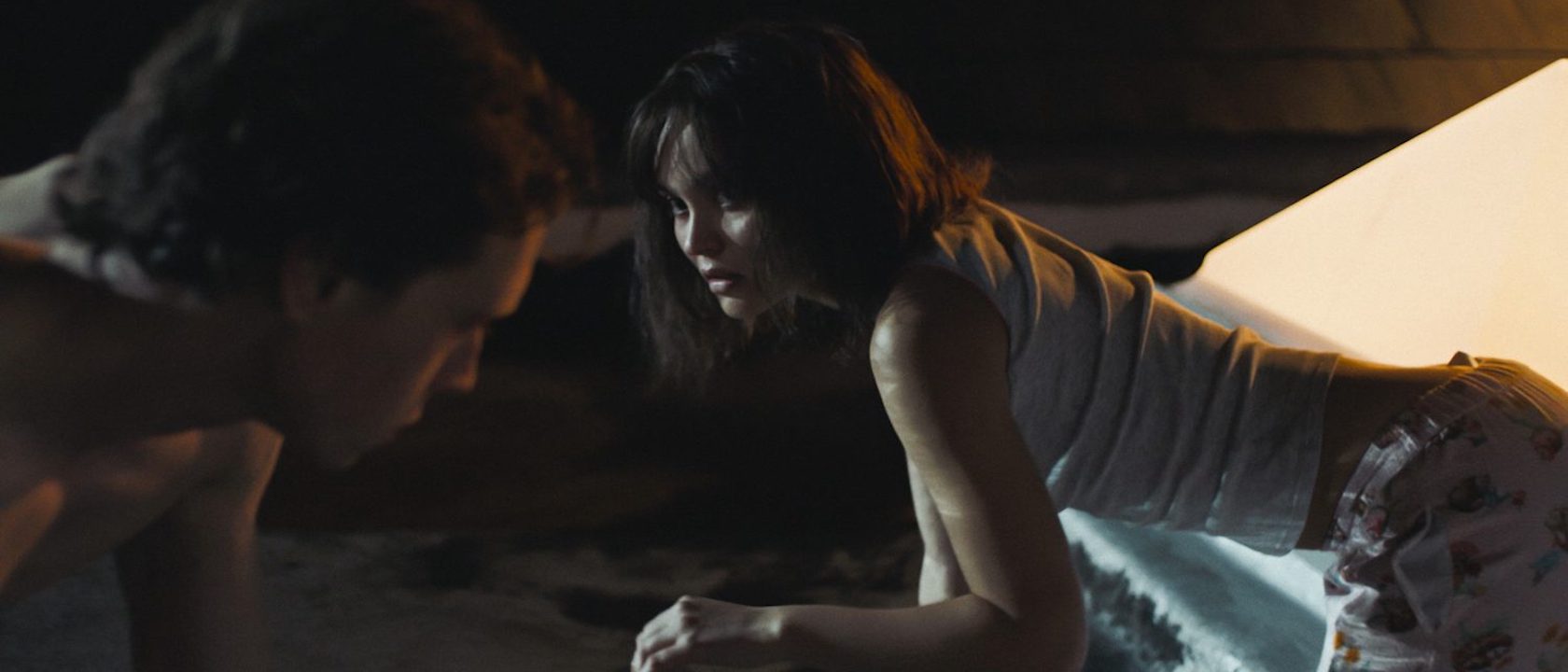What separates man from beast? It’s a question that feels inherent to being human – as it has been asked billions of times before in regard to our evolution as a species, and will continue to be debated long after this generation. Nathalie Biancheri’s Wolf adds to this inquiry by centering on a group of young people who are in a clinic because they identify as certain animals despite what genetics say. It’s a deep topic to be sure, but Wolf also cannot come to many conclusions; it can only poke the bear and unsettle its audience for a little while.
Wolf takes place wholly inside the walls if the aforementioned fictional clinic, which is a treatment center for individuals diagnosed with species dysphoria. George MacKay’s Jacob gets admitted into the mysterious place because he believes that he is not a human, but instead a wolf. At first, Jacob’s case doesn’t seem as severe as the other’s he meets, but as the movie unfolds his identity howls out and he finds solace in Lily-Rose Depp’s Wildcat, who has spent her whole life in the clinic.
Nathalie Biancheri boldly creates a weird and uncomfortable atmosphere to explore an original concept and real disorder in Wolf.
The movie is written and directed by Italian filmmaker Nathalie Biancheri as her second feature. She creates a disquieting yet sometimes quirky atmosphere with Wolf, leaving its audience navigating through emotions of discomfort (perhaps awkward laughter at first) as we see the dynamics between the individuals – both patients and caretakers – in the clinic. There’s a lanky teen acting like a squirrel, a fresh-faced young man who has the ticks of a German Shephard, and so forth. As the movie progresses, we begin to see species dysphoria more clearly and through a more hardened lens.
Although there’s a real condition being explored here, if you didn’t look it up you may not know it. The tone of Wolf is between a rock and a hard place as Biancheri attempts to add levity to its stone-cold script, whilst also bringing to light some complicated emotions about how we see animals as a society and how we treat them. There’s an odd flip that occurs when we see humans identifying themselves as animals and wrestling with the life of an animal through mankind’s eye that is interesting to see explored. Wolf is not gruesome visually, but the word comes to mind as the the narrative unfurls. As its characters go through their treatment, a collective knot forms in the audience's stomach .
Wolf’s biggest strength is in George MacKay and Lily-Rose Depp fully committing to their roles.
The greatest strength of Wolf lies in the tremendous commitment the actors demonstrate in their performances. When George MacKay’s Jacob reveals himself as the wolf he believes himself to be, you absolutely believe it. The way McKay stretches his body, altering his physicality, and howls at the moon could and should be comical and ridiculous, but MacKay nails it. Alongside him is Lily-Rose Depp, whose character is not as fleshed out as McKay, but he turn is oozing with dimension and presence. Together, you see them in front of you but almost start to see an invisible overlay of the animals they seek to embody.
Unfortunately, there’s also an ambiguity about them. While Wolf really could have taken this opportunity to really flesh out its core characters and help us understand why and how they believe themselves to be wolf and wildcat, there’s a massive blindspot to their character development. With them in frame, it can feel like you’re looking at a really interesting and complex painting, but you have not enough information about the artist’s technique and reasoning behind it to fully grasp why and what you’re looking at. It means well and there’s some great moments between them, but Wolf gets heady on its concept in places where it perhaps needed to ground us down or take a step back.
There’s a lot of powerful ideas Nathalie Biancheri begins to explore, but it sadly never lands on a focus.
Nathalie Biancheri proves she is an interesting and unique filmmaker with Wolf, and one to take note of and follow. The concept evokes strong emotion about society’s sharp and dangerous grip over nature and instinct, but it also can feel hollow. The uncomfortable experience will likely stir within you days after viewing it, perhaps start conversations and curious Google searches, but it also leaves its audience with more questions, apathy, and overall confusion about what it is really trying to say.
Your Daily Blend of Entertainment News

Sarah El-Mahmoud has been with CinemaBlend since 2018 after graduating from Cal State Fullerton with a degree in Journalism. In college, she was the Managing Editor of the award-winning college paper, The Daily Titan, where she specialized in writing/editing long-form features, profiles and arts & entertainment coverage, including her first run-in with movie reporting, with a phone interview with Guillermo del Toro for Best Picture winner, The Shape of Water. Now she's into covering YA television and movies, and plenty of horror. Word webslinger. All her writing should be read in Sarah Connor’s Terminator 2 voice over.

